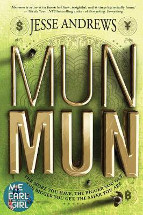MunMun by Jesse Andrews

Allen and Unwin, 2018. ISBN 9781760523596
(Age: 12+) Highly recommended. From the opening chapter, in its
enigmatically entitled 'LifeandDeathWorld, Prayer', Jesse Andrews
plunges the reader into a strangely dystopian world. Andrews plunges
into a reality that is actually full of terrible iniquities and
compromising levels of power, where a large amount of money and
power brings riches and enables people to undergo a change to
increasingly larger size, and with a loss of power reduced to its
opposite, utter powerlessness, brings the tiniest creatures of all,
the 'littlepoor'. Shape and size reflect wealth and poverty,
categorized for us clearly on the inside cover of the novel. Plato,
Geoffrey Chaucer, George Orwell, Dr Seuss, Joseph Keller, and Ray
Bradbury wrote with a similar purpose, warning us of what they found
amiss in their own times.
When Jonathan Swift wrote, "Nothing is great or little otherwise
than by comparison" in Gulliver's Travels, we were
introduced to his notion of a world at risk in his strangely peopled
world. Andrews has chosen Swift's words to preface his work, MunMun,
and his depiction of a notion of size and scale, that relate
directly to power, is clearly at the heart of his construction of
story, place and time. We discover immediately that characters in
this novel can be almost as small as an acorn and can grow in
importance, that is, having the money and power to 'upscale', to
being as large as doublescale, or as 'Bigrich", even enabling a
transformation to almost absolute power - where a character might be
'transformed' - to be as tall as a skyscraper. Of course, they can
be scaled down or even be forced to return to minute size under
certain conditions. In fact they can be any shape or size or colour,
such as Prayer, who has "ruby wine skin" with a head "narrow and
shaped like a bean".
Characters might live in different places, yet both place and
character appear to float in time and space, and characters might
take themselves to places where they feel comfortable or visit
unsettling places. We understand that in 'dreamworld', characters
might create dreams that can be shared or tap into the dreamworlds
of others, but in this particular world everyone is 'exactly
middlescale' and everyone is safe. Here people are free to create
anything that they desire, such as making a 'pool out of cloud'. In
"lifeanddeathworld" characters are fearful of the dangers. Irony is
at play here, as surely these worlds reflect our own world just as
it is, even undiscovered: a series of planets, moons and suns all
floating in space.
At the heart of all his worlds "Mun mun" dominates people's lives
and his warning, through analogy, is clear. His chilling stories,
the harsh worlds of his characters, and their fate, are a clarion
call to us to be aware of some of the worst aspects of our world.
Words and phrases are frequently suggestive of our world, reflected
in its enigmatic nature. The seductive lyricism of this novel, and
its powerful suggestions deeply underlie its political intent: as we
read of people who are 'middlepoor", we are surely expected to
consider what Andrews is suggesting.
There is a hint of a thread of kindness and goodness that is
depicted strongly in the central character and his family,
particularly in the religious beliefs and loving kindness of the
mother, who believes in the "Lord King God" and old-fashioned
religion, and whose gentle soul does not tap into the terrifying
world that is at the heart of this novel. Whom can you trust? There
are good people, there is loving and there is kindness, but mostly
there is fear and rivalry and powerlessness that threaten all who
try to survive their 'little lives'.
Satirical, fast-paced, and at times terribly violent, with many
people showing almost no concern for the wellbeing of anyone outside
of their own body type, the characters of Andrews' novel are
distorted to reflect his purpose. The biting humour, deep sarcasm
and pervasive fear would seem also to reflect our modern world.
Exposing his characters' dread of the power of 'the other', he
creates those 'huge' people who must be respected and obeyed, and
the reference is clear. We are led gently but firmly to consider
power that controls and often that destroys others, and to be aware
of the ever-present threat of a world of dark and terrible violence.
Elizabeth Bondar